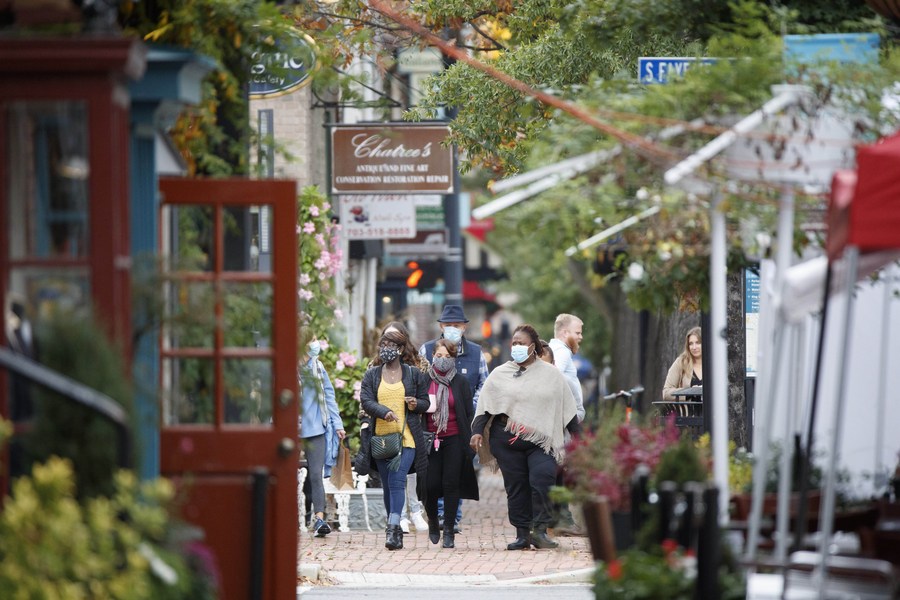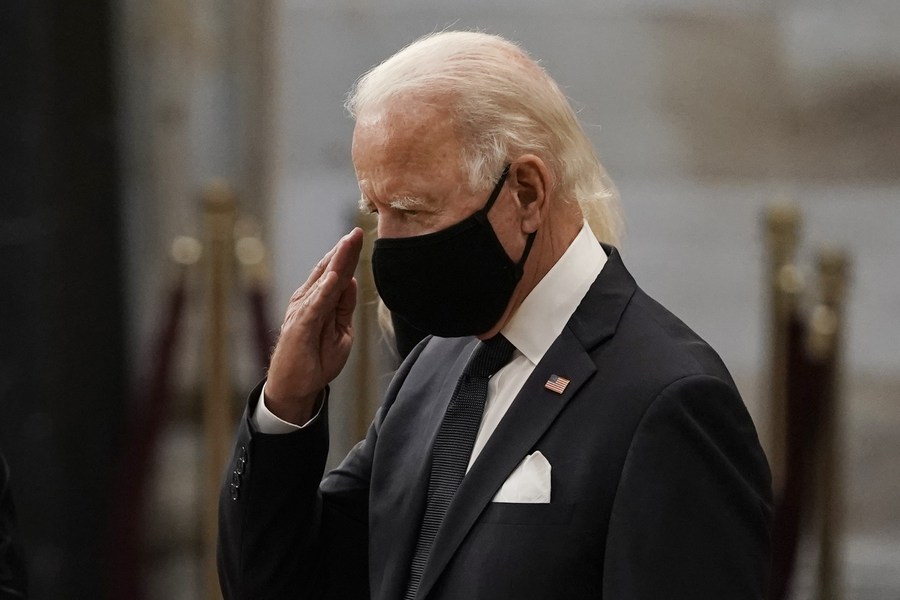
Pedestrians wearing face masks walk through Times Square in New York, the United States, Sept. 28, 2020. (Xinhua/Wang Ying)
Beyond telling people to wear masks, U.S. media has by and large failed to delve into the question of whether all masks and face coverings are the same, whether they must be regularly changed and so on. U.S. media has instead chosen to politicize the issue, many ordinary Americans said. Meanwhile, mask wearing has become a topic in the recent presidential debates.
by Matthew Rusling
WASHINGTON, Oct. 26 (Xinhua) -- Frank, a barista in his early 30s, wears a mask only when he is required to.
While on duty at the coffee shop where he works, he wears a mask. But when he's not at work - such as socializing with friends or walking - he usually leaves it off, he said.
"I don't really think I need it," said Frank, who declined to give his last name.
Indeed, nearly a year after COVID-19 first appeared, ordinary Americans have still not come to a uniform consensus on mask wearing. Some wear masks wherever they go - even while alone in their own car - while others avoid wearing one unless required to do so at a restaurant, coffee shop or other businesses. Others are various degrees of in between.
The U.S. Centers for Disease Control has emphasized the importance of wearing a mask. But ordinary Americans still have questions: Do all masks provide the same protection? Do people need to change their masks daily? Should people avoid touching the outside of the mask and then touching their face? Is a simple face cloth the same as an N95 mask?
Sally Kotter, a logistics expert residing near Washington, D.C., when asked whether she believes a mask will keep her safe, told Xinhua that while she does not believe it is 100 percent effective, she believes it "absolutely helps."
"I just know to wear masks, stay away from people, limit the time I go out, don't touch my face, and always wash my hands," she said.

People wearing face masks walk on a street in Alexandria, Virginia, the United States, on Oct. 16, 2020. (Photo by Ting Shen/Xinhua)
Lilly Moss, an engineer living and working outside Washington, D.C., when asked the same question, told Xinhua she believes that masks do not protect 100 percent, but they "help a lot."
She added that U.S. media is not doing a good job of providing scientific explanations of how exactly the virus spreads.
"It seems like (U.S. media) only talk about how many cases and if it's going up or down," Moss said.
Indeed, that is the sentiment among many Americans with whom the reporter has spoken. U.S. media has failed to provide frequent scientific reports on how the virus spreads, what actions pose the most risk and which behaviors have a lower level of risk, interviewees said.
Beyond telling people to wear masks, U.S. media has by and large failed to delve into the question of whether all masks and face coverings are the same, whether they must be regularly changed and so on. U.S. media has instead chosen to politicize the issue, many ordinary Americans said.
There are some exceptions, however.
The Wall Street Journal has reported that there is a growing consensus on how the virus spreads.
Close contact for long periods of time pose the highest risk of transmission, the publication reported in a June article entitled "How Exactly Do You Catch COVID-19."
"Fleeting encounters are less of a worry than close-up, person-to-person interactions for expended periods," the Journal reported, basing the story on interviews with a number of medical experts.
However, another recent case in a Vermont prison suggested brief but multiple, cumulative exposures to an infected person can spread the virus, U.S. media reported.
Some news outlets have highlighted how the case shows the importance of wearing a mask.
MASK POLITICS
Mask wearing has become a topic in the recent presidential debates and town halls. U.S. President Donald Trump himself is often seen in public not wearing a mask, while contender Joe Biden is usually seen wearing one.

File photo taken on July 27, 2020 shows U.S. Democratic presidential nominee and former U.S. Vice President Joe Biden paying his respects to late U.S. congressman and civil rights figure John Lewis at the Capitol Rotunda in Washington, D.C., the United States. (J. Scott Applewhite/Pool via Xinhua)
Trump, who contracted and then recovered from COVID-19, has said he is not against masks, but said he wants Americans to have the freedom to choose to wear one or not. He is against a forced national mandate.
Biden has often hinted at a national mask mandate but has been unclear about whether he believes it would be a breech of restrictions on federal power, and U.S. media has thus far not challenged him on the issue.
Biden said if elected, he would urge U.S. state, local and county officials to implement a mask mandate in their jurisdictions.
Social media giant Twitter, which has come under scrutiny in recent weeks for what critics said is suppressing freedom of speech, removed a Tweet from Dr. Scott Atlas, one of Trump's top coronavirus advisors. The post said masks do not prevent the spread of the virus.
In a follow-up message later, Atlas urged people to "use masks for their intended purpose - when close to others, especially hi risk. Otherwise, social distance. No widespread mandates." ■



